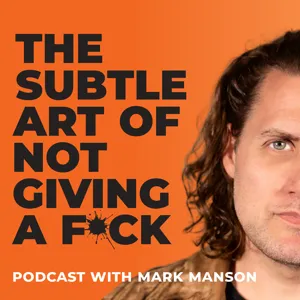Podcast Summary
Embracing the Finite Nature of Time: Rather than trying to do more, consider embracing the limitations of time and choosing to be bad at or not do certain things to live more fulfilling lives
Our perception of time and its management significantly impacts our sense of self-worth. We often feel overwhelmed by the demands of modern life and try various methods to manage our time effectively. However, the speaker suggests that rather than striving to get more done, we may benefit from embracing the finite nature of time and choosing to be bad at or not do certain things. This counterintuitive approach can help us live more fulfilling lives and reduce anxiety. Joining the conversation is Oliver Birkman, author of "4000 Weeks: Time Management for Mortals," who brings fresh insights into classical personal development topics. For those interested in assessing their own time management, Mark Manson offers a free 2024 life audit PDF for those who leave a review of the podcast. This PDF guides users in evaluating their time usage and making improvements. Overall, the episode invites listeners to reconsider their relationship with time and explore new ways to live more intentionally.
Seeing ourselves as part of time, not against it: Embrace limitations, work sequentially, and focus on the present to live fully, rather than trying to do it all and missing out on the present
Our relationship with time is often seen as a struggle or a fight to make the most of it, but this perspective can lead to missing out on enjoying the present. According to the discussion, this notion is a relatively modern concept and in pre-industrial times, people saw themselves as part of time rather than having it. To apply this practically, it means accepting our limitations and working sequentially on things, being willing to neglect some to focus on others. This approach may seem like a defeat, but it's actually a way to embrace the truth of being a finite person in an infinite world. In essence, the discussion suggests that striving to do it all can prevent us from truly living in the present and experiencing life fully.
Choose what matters most and let go of the rest: Prioritize and focus on what truly matters, intentionally letting go of less important responsibilities or relationships to make the most of our time and energy
It's important to consciously choose what we focus our energies on and accept that we can't excel at everything. This concept, called "strategic underachievement," means intentionally letting go of certain responsibilities or relationships that aren't as important to make room for the things that truly matter. This idea can be uncomfortable for some, but it's a reality of having finite resources. By prioritizing and working sequentially on projects, we can trust that other areas of our lives will get their turn. This concept requires trust in ourselves and the understanding that we don't have to do everything at once. It's a way of fully engaging in our human limitations and making the most of our time and energy.
Setting realistic expectations and saying 'no': Prioritize self-care and authenticity over pleasing others, set realistic expectations, and learn to say 'no' to maintain healthy relationships
People-pleasing behavior often stems from a fear of judgment and disappointment, and it's important to set realistic expectations with ourselves and others. The speaker shares his personal experience of realizing that trying to please everyone is not only unsustainable but also unfulfilling. He suggests that acknowledging the limitations of our capabilities and being honest about what we can and cannot do can lead to less suffering and more authentic relationships. The speaker also emphasizes the importance of saying "no" when necessary, as it can make things easier for everyone involved. Ultimately, the key takeaway is to prioritize self-care and authenticity over the need to please others.
Recognizing the harm of people-pleasing: People-pleasing can harm relationships and productivity, it's important to set boundaries and prioritize own happiness for better outcomes.
People-pleasing behavior, which stems from a desire to meet all demands and avoid disappointing others, can ultimately harm relationships and productivity. This urge can lead to doing subpar work or being a net negative in social situations. It's essential to recognize that this behavior doesn't benefit anyone and can even bring down the mood of social events or projects. Furthermore, the guilt of declining invitations or taking on too much work often outweighs the actual consequences. It's important to remember that the world doesn't revolve around us and that setting boundaries and prioritizing our own happiness can lead to better outcomes for everyone involved. My wife's approach of only attending events that she's excited about serves as a reminder that it's better to be present and engaged than to attend reluctantly and bring down the mood. Ultimately, recognizing the futility of people-pleasing and prioritizing our own well-being can lead to healthier relationships and increased productivity.
Finding freedom from the pressure to change the world: Embrace the value of personal fulfillment and joy, even if not grandiose or conspicuous, and avoid sacrificing self-worth for external validation.
We often make life unnecessarily complicated by trying to prioritize and fit in all our values and desires, leading to feelings of guilt and stress. The understanding that something must always give can be liberating. Another point discussed was the motivation behind the idea of not trying to change the world, which was seen as potentially excluding those whose impact may not be as grandiose or conspicuous. It was argued that definitions of a meaningful life should not be limited to those who make a significant impact on millions, but should also include less noticeable actions and experiences that bring personal fulfillment and joy. It's important to remember that these moments matter in themselves, rather than just in terms of their long-term impact or statistical significance. Avoiding a toxic relationship with goals and recognizing the potential self-defeating nature of sacrificing self-worth for external validation were also touched upon.
Toxic relationship with time based on efficiency and optimization: Instead of controlling time, adopt a healthy perspective and inhabit each moment fully. Flexibility in using presence and goal-setting is essential for a balanced relationship with time.
Our relationship with time can become toxic when we base our self-worth on efficiency and optimization, leading to a never-ending cycle of striving for the next level of productivity. This mindset often leaves us feeling disappointed and unsatisfied after achieving our goals. Instead of viewing time as a partner to be controlled, it's essential to adopt a healthy perspective and inhabit time, experiencing each moment fully. Latin American culture offers an alternative understanding of time, emphasizing presence and enjoyment. While both being present and setting goals are valuable skills, it's crucial to understand that they are just tools. Flexibility in when to use each approach is key to maintaining a balanced and healthy relationship with time.
Avoid over-reliance on productivity tools and techniques: Seek balance between being present and productive, find joy in actions and express fulfillment through them.
Productivity techniques and tools are not inherently bad, but rather they should be used as tools to help us when we need them, and put aside when they no longer serve us. It's important to avoid becoming overly identified with these methods and instead, strive to center ourselves in the present moment. Additionally, there's a potential way of thinking about action that shifts it from something we do to achieve future fulfillment, to the expression of fulfillment itself. This means doing things we enjoy and finding meaning in the action itself, rather than viewing it as a means to an end. The ultimate goal is to find a balance between being present and productive, without letting either one consume us completely.
Practicing presence to overcome procrastination and anxiety: Adopt a mindset of effortless action and be present to defeat procrastination and become more productive. Let go of attachment to external factors like goals and politics to lead a fulfilling life.
The key to overcoming procrastination and anxiety about outcomes lies in practicing presence and focusing on the present moment. This idea is echoed in various spiritual traditions, such as Zen Buddhism and Taoism, which emphasize the importance of being fully engaged in the task at hand and letting go of self-impeding thoughts. By adopting a mindset of effortless action and being present, we can defeat procrastination and become more productive. It's important to remember that our goals, politics, and productivity are tools to be used, not aspects of our identity. The core tenets of Buddhism, which emphasize the lack of a fixed self, align with this idea and can help us lead more fulfilling lives by letting go of our attachment to these external factors. My own background with Buddhism includes attending a Zen meditation group in New York, where I have gained a deeper understanding of these principles and their practical applications in daily life.
Zen Buddhism's appeal to left-brain thinkers: Zen Buddhism's use of koans intellectually engages left-brain thinkers, providing moments of presence and awareness beyond the thinking mind, contrasting with emotionally-focused religions.
Zen Buddhism, with its focus on analytical thinking and intellectual puzzles, appeals to individuals with a strong left-brain orientation. The use of koans, or teaching stories, challenges the mind to its limits, leading to moments of presence and awareness beyond the thinking mind. This approach contrasts with more emotionally-focused religions, and even some aspects of Christianity, which may not engage the analytical mind as effectively. The paradoxical nature of Zen's teachings, which often lack logical solutions, can be intellectually satisfying and even pleasurable, despite the apparent lack of answers. Growing up in a religious background that did not engage the analytical mind, the speaker found Zen's intellectual challenge to be a refreshing and rewarding experience.
Misconceptions in Religion and Productivity: Focus on present moment and personal growth, avoid misconceptions of finding perfect future or avoiding questions in religion and productivity
Both Christianity and Buddhism can present different forms, and encountering the wrong one can lead to frustration and misconceptions. In Christianity, one might face scholastic monastic forms that discourage questioning, while in Buddhism, one might find folk forms that encourage finding meaning in the present. Regarding productivity and time management, a common misconception is believing that the key to success lies in the future. This notion that we'll have everything figured out soon and that our lives will become smooth sailing once we find the right system or self-discipline is a myth. Instead, we should focus on bringing meaning to the present moment and continuously transforming ourselves. As a final piece of wisdom, Charlotte Jocobec, an American Zen teacher, once said, "What makes it unbearable is your mistaken belief that it can be cured." This statement highlights the importance of recognizing that life's challenges cannot always be solved, and it's essential to learn how to embrace them instead. So, remember to find meaning in the present, keep asking questions, and don't let the belief in a perfect future hinder your personal growth.





